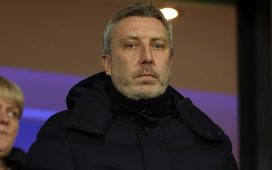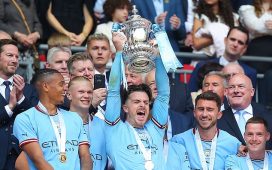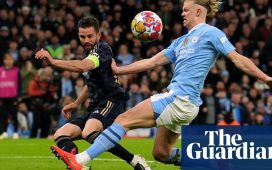Harry Winks has heard the theory. If Michael Carrick were Spanish, the land of tiki-taka, he would have received greater recognition during his playing days and the same is possibly true of Paul Scholes in his latter years. Winks is inclined to agree. People in England do not appreciate the importance of the midfield pivot.
“Everyone always talks about Scholes and Carrick,” he says. “People like Carrick get a lot of recognition after they retire and they are more players’ players, as such. Every team needs goalscorers, attacking players, players who can sweep up the ball, but every team needs that someone who can be the link between defence and attack. The greatest teams always have that sort of player.
“In England, especially, there is always an impetus to look for the attack-minded players. When we score, it’s: ‘Who has affected the game that way?’ But when we break the game down and look in depth at the reason why it has happened … I think that is overlooked slightly.”
Winks’s role under Mauricio Pochettino at Tottenham was well established. He was the player who got the team moving, often out of tight spots with a smart pass or touch on the half-turn. But when José Mourinho took over as the manager in November, it was easy to think that Winks might not be his kind of midfielder.
Mourinho has often preferred the man in front of his backline be defensive-minded, first and foremost; tough-tackling and physically imposing. Would he appreciate the nuance and subtlety of Winks’s game? Mourinho started Winks in three of his first four matches but then there was a run of seven games when he barely used him. He opted for Moussa Sissoko and, usually, Eric Dier.
Winks has had to adapt and although his prospects were helped by the serious knee injury that Sissoko suffered at Southampton on New Year’s Day he has done so to win Mourinho’s trust. He has started in Tottenham’s past 11 matches and will make it 12 when Wolves visit on Sunday.
Winks talks in that slightly euphemistic footballer’s way of how Mourinho “pulled” him for an “honest conversation”. He does not specify when but it was plainly during his time out of the team. He also makes the point that Mourinho was the first managerial change he has experienced. Previously, the 24-year-old had played only for Pochettino at senior level. It was alien and unsettling.
“From the beginning, I was in and out,” Winks says. “The manager told me what he believed I needed to do. I’ve upped my training levels a bit and since then I have had a lot more minutes. It was just an honest conversation, which I respect massively. I just think it was my whole level and the intensity as well. I said to the manager that I agree. It is something I went back and did.”

What Mourinho has wanted to see from Winks is defensive security. Everybody knows it is the foundation upon which he builds; Mourinho demands discipline and, essentially, obedience from his players without the ball.
“He prefers defensive shape and being organised,” Winks says. “That is something we needed to improve on anyway because we were shipping too many goals. He definitely appreciates what everyone’s qualities are. He has said it many times: he wants us to keep the ball, he wants us to create chances and he wants us to build from the back when it is the right time. We are still in the early phases of working out what the strategy is and what the tactics are.”
Mourinho’s current lineup features several players of diminutive stature, including Winks and, again, this is not the kind of dynamic with which he has been associated. Winks makes light of it. “The manager will have his structure and his style of play but that is not to say that just because we have the physique of someone shorter we can’t do what he likes,” he says.
For Winks, it is not about lifting weights and being harder and stronger; rather reading the game and being one step ahead. “When we play Man City, De Bruyne is very good at getting into the pockets behind full-backs and it was my role to track that area,” Winks says. “In another game it might be to be more front foot and aggressive in the pressing.
“Defensively, my role is a lot more important and I can totally agree that I needed to improve on that. I think I’ve done so under the new manager. I feel like when I’m playing now, I am more of a leader than I was one or two years ago.”








